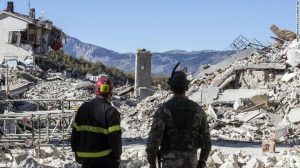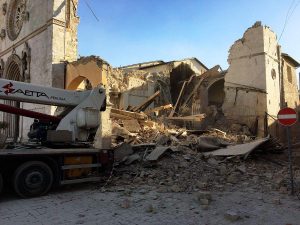Thousands of Italians have spent the night in cars, tents and temporary shelters after the fourth earthquake in the area in three months.

The 6.6-magnitude quake – Italy’s strongest in decades – struck close to the region where nearly 300 people were killed by a quake in August this year.
At this stage, no-one appears to have died in the quake near the town of Norcia, but about 20 people were injured.
Over 100 aftershocks were registered overnight into Monday. These included one with a magnitude of 4.2.
At least 15,000 people are estimated to be in temporary accommodation, including 4,000 who have retreated to shelters provided by the authorities on the Adriatic coast.
In Norcia, in the Umbria region, some locals have decided to stay in their homes, while others spent the night in tents pitched near the town or have left for the coast.
Prime Minister Matteo Renzi is chairing a cabinet meeting to discuss emergency reconstruction efforts.
Norcia resident Stefano Boldrini, who is now living in a van with his eight-year-old daughter, was asked if they planned to stay in the area.
“How could we? There’s no more school, or church, or police station. There’s nothing here any more,” he said.

The medieval basilica of St Benedict in Norcia was among many historic buildings that were destroyed.
Officials said three people were dug out of the rubble alive in the town of Tolentino on Sunday.
Tremors from the latest earthquake were felt in the capital Rome, where the metro system was shut down but is now reopening.
Central Italy has seen several major quakes in recent years. Earthquakes which devastated the town of L’Aquila in 2009 and Amatrice in August this year killed about 300 people each.
#terremoto strada per norcia pic.twitter.com/ToWN4gmFis
— sabrina fantauzzi (@sabrinafantauzz) October 30, 2016
This story first appeared on BBC News
